Excellent educational background, bold and meticulous thinking, a value system that pursues high risk and high returns, and a rebellious adventurous personality have shaped the present-day Arthur Hayes.
Arthur Hayes is an African American entrepreneur and banker born in 1985, and is also one of the co-founders of the cryptocurrency exchange BitMEX. BitMEX is one of the world's largest cryptocurrency derivative exchanges, specializing in futures, options, and perpetual contracts for cryptocurrencies such as Bitcoin. He and the founders of BitMEX together invented the perpetual contract that changed the landscape of crypto trading.
Hayes graduated from the renowned Wharton School of the University of Pennsylvania in 2008. After working as a trader at a bank, he chose to immerse himself in the forefront of the cryptocurrency revolution upon encountering Bitcoin, founding an exchange. At one point, his net worth exceeded $1 billion, making him the youngest African American billionaire in history. In 2022, Hayes was prosecuted by the U.S. Department of Justice for violating the Bank Secrecy Act. Shortly after, he voluntarily pleaded guilty and was ultimately sentenced to six months of home confinement, two years of probation, and a $10 million fine. Now, Hayes has earned enough money, experienced enough youthful recklessness, been through the courts, and served time. He has left the hardships of the United States behind and is now deeply rooted in Asia, finding a peaceful place to write some small essays.
This article, combining various sources, humorously narrates the story of Hayes's career. It is evident that his excellent educational background, bold and meticulous thinking, a value system that pursues high risk and high returns, and a rebellious adventurous personality have shaped the present-day Hayes.
Early Financial Prodigy Experience
Although Hayes did not come from a wealthy background, he was not impoverished either. He was born into a middle-class American family, with both parents working for General Motors. He was born in Detroit, and in order to ensure a good education for him, his parents sent him to a private school in Buffalo, New York.
During his high school years, Hayes displayed athletic talent. He was a member of the school's tennis team and also a cross-country runner. Hayes even earned a scholarship based on his athletic achievements. During his college years, he also achieved a ranking in the "Mr. Penn" bodybuilding competition.
His ambition began to show during his college years. After enrolling at the University of Pennsylvania in 2004, Hayes and his friends would go to the university gym at 5:30 am every morning (right next to the Wharton School of Business) for a workout. According to an interview with NY magazine, Hayes mentioned that they would use this early morning time to contemplate their future, daydream, and imagine becoming a billionaire.
A friend who trained with him once said, "I think he saw himself as a financial wizard, a financier, more like Gordon Gekko than Mark Zuckerberg."
"I Don't Want to Stay in Buffalo, I Want to Go to China"
He was never content with following the norm. With his rebellious nature, Hayes believed that going to Manhattan or Wall Street after graduation would make him no different from his classmates, and he couldn't see any interesting prospects there. So, he decided to take a different path. During the summer of his junior year (2007), he finally secured an internship at Deutsche Bank in Hong Kong. This marked the beginning of his journey in Asia.
Hayes: "The old hats in Buffalo won't leave here, but I don't want to stay in Buffalo."
Reporter: "Then why not go to Manhattan?"
Hayes: "Why do the same thing as my classmates? I'll get the same results as them."
Even as an intern, Hayes, who had just arrived in Hong Kong, not only had to do his own work but also had to buy lunch for his leaders. Interestingly, he mentioned in one of his blog posts, "I made a considerable amount of tips on every meal, making a profit of several hundred dollars per week. To avoid any sense of impropriety, everyone in the trading department knew what I was doing and tacitly approved. It was an open secret."
Can going to nightclubs lead to a formal job? That's how Hayes did it. As graduation season approached, Deutsche Bank appointed several recruiters to recruit at the University of Pennsylvania. During the interview, Hayes mentioned that he enjoyed going to nightclubs in Hong Kong, and one of the interviewers even asked him about the nightlife in Philadelphia, to which he recommended some places. In the end, they all ended up getting drunk at Philly House in Philadelphia, and Hayes got his first official job after graduation at the Hong Kong branch of Deutsche Bank.
Hayes's flamboyant personality was evident even during his internship. In recent years, Hong Kong has embraced Casual Friday, where employees can dress casually on Fridays. At the time, Hayes's bank also followed this practice. According to his blog post, when he was an intern analyst, one Friday, a senior executive passed by his desk and asked his immediate supervisor, "Who the fuck is that?" The supervisor looked up and saw Hayes wearing a pink tight polo shirt, faded jeans, and bright yellow sneakers. From then on, the entire department no longer had Casual Friday. This guy was always pushing the boundaries.
First Encounter with Bitcoin
In 2013, Hayes first learned about Bitcoin. By then, he had already moved from Deutsche Bank to Citibank, but was soon laid off. According to his own recollection, his first trade was buying BTC spot from the Mt Gox exchange, then depositing it into the ICBIT exchange (the exchange that invented coin-based contracts), and finally selling a BTC/USD coin-based futures contract expiring in June of the same year at a premium, resulting in a net profit of a staggering 200%, earning him thousands of dollars. After that, he couldn't be stopped.
At the time, the Chinese government had strict capital controls, and Bitcoin had a significant premium in the mainland market compared to Hong Kong. Hayes noticed this and began buying Bitcoin at a low price from Hong Kong exchanges and selling it on mainland exchanges. He would also directly withdraw the profits to a fake mainland bank account, then cross the border to Shenzhen by minibus, withdraw a bag full of cash, and bring it back to Hong Kong. After several such experiences, he aroused suspicion from the Hong Kong authorities. On one occasion, border officials detained him on suspicion of dubious Bitcoin transactions. Hayes had to lie and claim to be a victim in the transaction in order to be released.
Rise of BitMEX
After the collapse of Mt Gox, which once held an 80% market share, China's three major exchanges—Huobi, OKCoin, and BTC China—absorbed most of the market share. Meanwhile, overseas exchanges such as Bitfinex, ICBIT, and Bitstamp held market share outside of China. The market competition was fierce, and each had its own survival strategy: Bitfinex relied on a peer-to-peer lending market and the support of USDT, ICBIT invented inverse futures contracts (coin-based contracts), Bitstamp, well… was stolen 5 million, and Coinbase was more friendly to retail investors and had only just opened for a year, flourishing as a new exchange.
Despite this market environment, Hayes still saw an opportunity for himself. His expertise at Deutsche Bank and Citibank lay in futures contract trading. He believed that the existing exchanges were not professional enough. He wanted to provide professional Bitcoin trading experiences similar to stock trading on Wall Street for the big shot traders. This led to the idea of starting a cryptocurrency derivatives exchange. He envisioned a platform that only accepted Bitcoin, resembling Bloomberg's terminal in appearance and functionality, making Bitcoin trading as professional as stock trading on Wall Street. He then approached Ben Delo and Sam Reed, both passionate coding wizards in the crypto field. In 2014, the three of them officially established BitMEX in Seychelles, with Hayes as the CEO. On the first day of the exchange's official launch, it achieved a trading volume of $50 million.
Although the opening was grand, the first half-year of business was not ideal. It wasn't until the spring of 2015 that Hayes considered giving up and proposed to his two partners: since second-hand electronic products were popular in Hong Kong, why not start a business reselling second-hand iPhones? The two partners did not agree. In the end, they decided to use high risk and high returns as their unique selling point to attract users. The reason why futures trading had such high profits was due to leverage, where you could borrow additional funds after pledging a certain amount of assets. The more you borrowed, the higher the leverage, but also the higher the risk. Hayes and his team decided to increase BitMEX's leverage to 50 times, meaning that the maximum position with 1 BTC as collateral could be leveraged to 50 BTC. They later increased the leverage to 100 times. At the time, this far exceeded the leverage levels of their competitors, making BitMEX the gathering place for the most "daring" gamblers and miraculously turning BitMEX from loss to profit. Ultra-high leverage thus became the core of BitMEX's brand, to the extent that the parent company's name was changed to 100x Group.
Invention of Perpetual Contracts
Hayes once said in a YouTube video, "Some of our competitors who offer similar products focus on retail investors. Why don't we target retail investors as well?" However, retail investors are not all finance professionals and lack solid financial knowledge. Many retail investors, who are completely unfamiliar with derivatives, come to trade on BitMEX and find themselves unable to understand the contracts, only to watch their money disappear when the contracts expire.
According to an interview with NY magazine, many retail investors used to email Hayes to complain that their contracts "suddenly disappeared, gone." In reality, their contracts had expired. As a result, these retail investors complained that Hayes and BitMEX were big scammers.
Delo was the first to come up with the idea of improving this product: could they create a futures contract that doesn't expire? This would solve the problem for retail investors. So, the founders continued to explore this idea, and the inspiration flowed, to the point where they could even write out their thoughts on a napkin in a noisy bar.
The result was the emergence of BitMEX's greatest and most iconic innovative product: the Perpetual Swap. It cleverly avoided the drawback of traditional futures contracts always having expiration dates (a 24x7 market always having expiration restrictions can be a big hassle), while still fulfilling the function of traditional futures contracts: allowing long positions to profit when the price rises and short positions to profit when the price falls.
The Perpetual Swap, also known as Perp, is a type of futures contract trading without an expiration date, cleverly using funding rates to anchor the contract price to the spot price. This allows investors to enjoy the leverage convenience of contract trading while avoiding the hassle of expiration and rollover. For more information about Perp, please refer to: What is a perpetual contract?
Since BitMEX launched the first perpetual contract product XBTUSD perp in May 2016, more and more exchanges have followed BitMEX's lead and successively launched perpetual products. Bybit and OKEx launched in December 2018, and FTX and Binance launched in October and December 2019, respectively. Interestingly, when Binance launched its futures contract testnet, BitMEX even mocked them in a tweet: "Congratulations to Binance for launching a futures contract testnet. Seeing you copy our documentation is as joyful as writing our own documentation. We're really happy for you!"
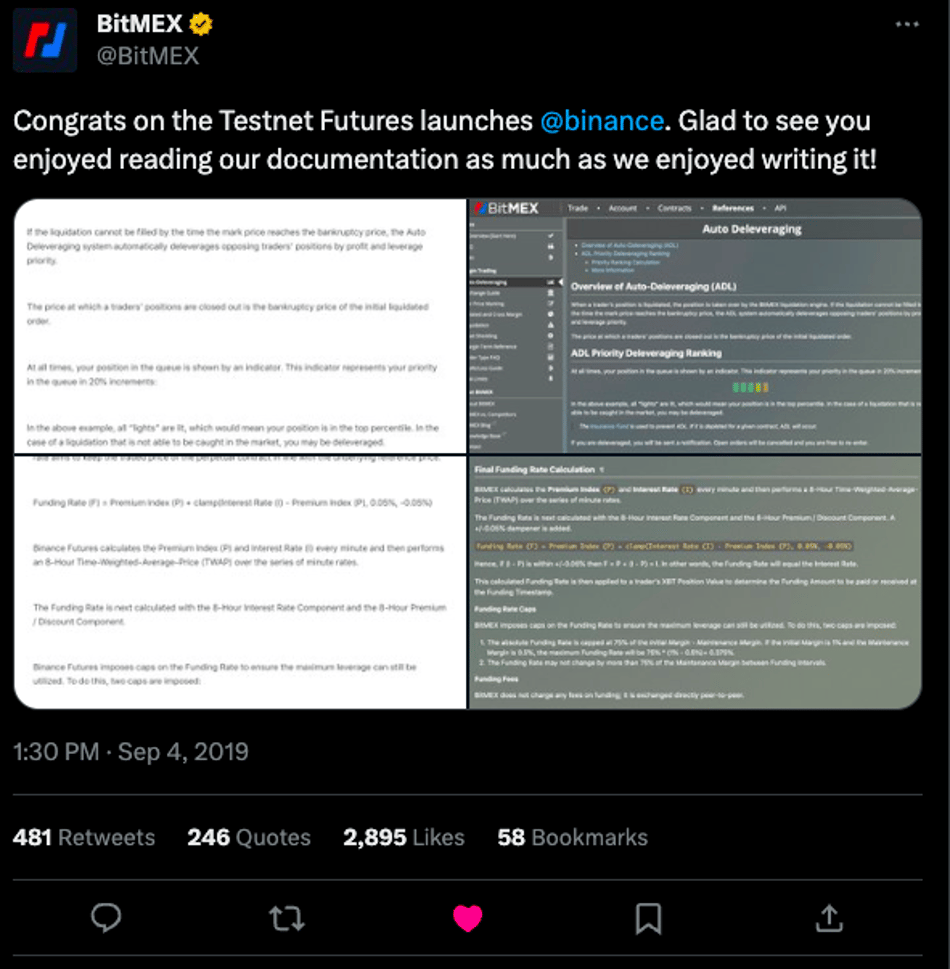
Source: BitMEX
Although perpetual contracts did not immediately become popular, this excellent product eventually sparked a market revolution. Today, the quarterly trading volume in the derivatives market has exceeded $660 billion, with perpetual contracts accounting for over 90%.
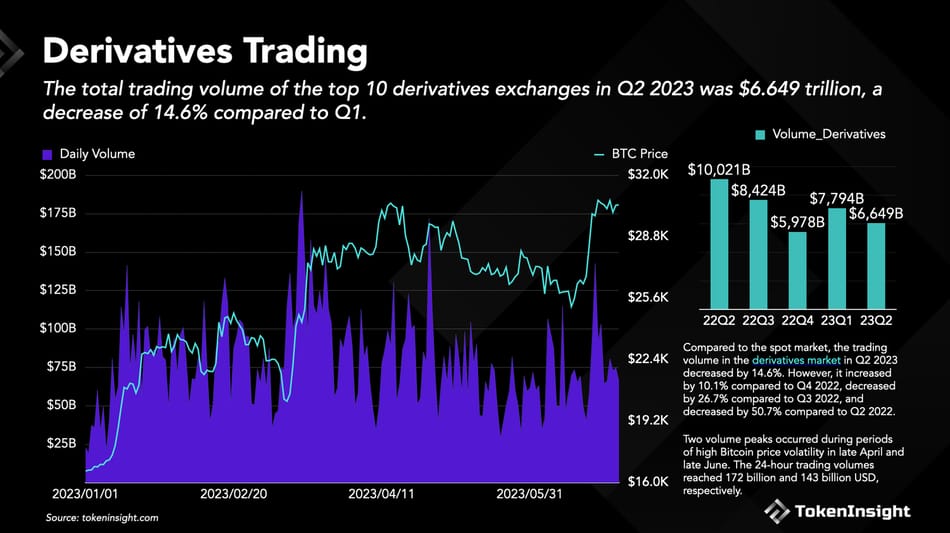
Source: TokenInsight
Flaunting Wealth
In 2017, BitMEX was doing well, and there were people interested in buying them. Hayes and the BitMEX founders rejected a buyout proposal from a venture capital firm. "Valued at $6 billion, that's too little," Hayes thought. When BitMEX was first established, the founders had struggled to raise funds, and now they naturally chose to retain all their shares. The following year entered a bear market, but this led to more frequent trading on their platform. That summer, BitMEX saw a single-day trading volume of up to $8 billion, bringing in $4 million in revenue for BitMEX on that day, showcasing its exceptional ability to attract funds.
In 2018, Hayes, now a successful young man, returned to his hometown to show off his wealth. In May, Hayes attended the Crypto event Consensus in New York and became the center of attention even before entering the venue: three Lamborghinis from BitMEX were parked illegally outside the venue in Midtown Manhattan. Hayes jokingly referred to this as a "guerrilla marketing" strategy and openly admitted that it might be a bit tacky, "a little bit gauche." Interestingly, these luxury cars were actually rented, and they were fined about a thousand dollars for illegal parking. Okay, this fits Hayes's flamboyant and wealthy personality.

Source: Arthur Hayes
Overnight wealth made Hayes a target in the crypto community, with countless people envious of how easy it seemed for him to make money. At the time, there was a joke circulating in the crypto community: "When others make money, Hayes makes money; when others lose money, Hayes still makes money." There was also an interesting meme, a seemingly self-sent message from Hayes to his company employees: "Stop loss for the sheep, I want to buy a Ferrari." This sarcastically implied that Hayes was trading against the market and users.
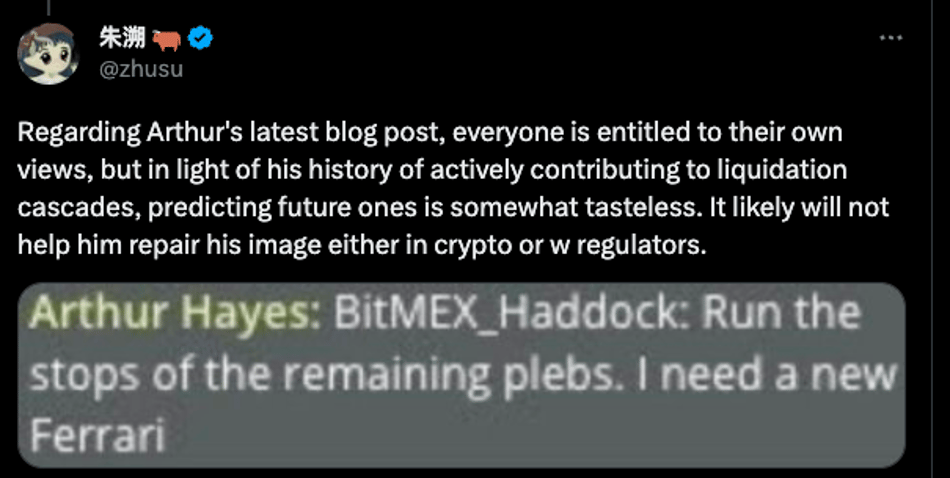
Source: Zhu Su
However, Hayes did not stop his show-off behavior. At the end of 2018, Hayes tweeted a photo of himself standing next to an ambulance donated by BitMEX to Seychelles, with a smug look on his face. The highlight of this photo was the sticker at the bottom, which read: "My other car is a Lamborghini."

Source: Arthur Hayes
The 2019 Tangle in Taipei debate is another highlight that must be mentioned when talking about Hayes. From a few classic quotes from this debate, you can get a sense of what it's like when someone is so arrogant. At the time, Hayes and the well-known economist and anti-cryptocurrency writer Nouriel Roubini engaged in a heated debate about Bitcoin and BitMEX on the show.
From their attire, it was clear that they were at odds: Roubini wore a suit, representing the traditional conservative camp, while Hayes wore tight jeans with holes at the knees, representing the avant-garde rebels. Less than 10 minutes into the debate, the arrogant Hayes made a shocking statement. When asked why the company was registered in Seychelles, Hayes replied, "I didn't want to bow down and take an ass-fucking from the U.S. government just because it’s regulated." When asked about the difference between the U.S. and Seychelles regulatory agencies, Hayes went even further, saying, "They (the U.S.) just bribe more expensively." And how much does it cost in Seychelles? "Just a coconut."

Tangle in Taipei
Backlash
There is an old Chinese saying, "Make a fortune in silence." Excessive flaunting and constantly pushing the boundaries of danger have made Hayes many enemies. Just a week after the 2019 Tangle in Taipei debate, on July 19, 2019, the CFTC, the U.S. Commodity Futures Trading Commission, began investigating BitMEX, suspecting that BitMEX was providing trading services to U.S. users. According to U.S. law, BitMEX, registered only in Seychelles, is not allowed to provide services to U.S. users. Naturally, the U.S. government did not tolerate this "jumping clown" who threatened its authority and disregarded the law, just as Alibaba's Ant Group missed out on its IPO after Jack Ma made arrogant remarks at a summit.
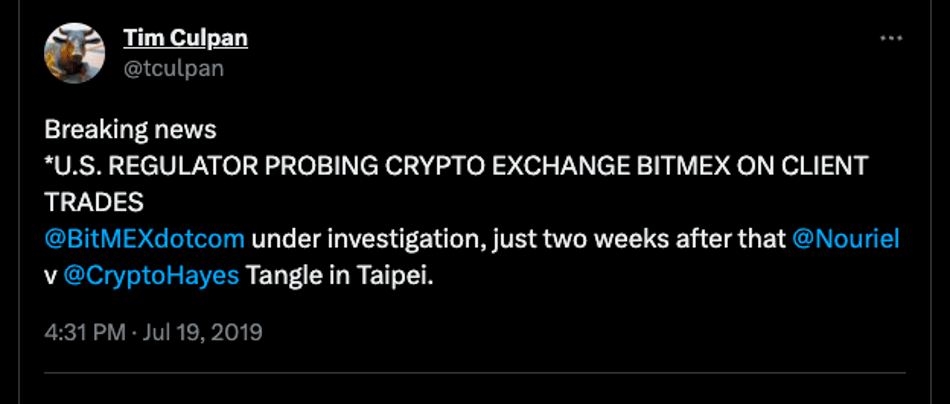
Tweet from a Bloomberg reporter
This incident happened less than a day, and BitMEX's net outflow of Bitcoin reached as high as $73 million, with the entire month of July seeing BitMEX's net outflow of Bitcoin exceeding $500 million, setting a historical record (never exceeding $100 million in a single month before).
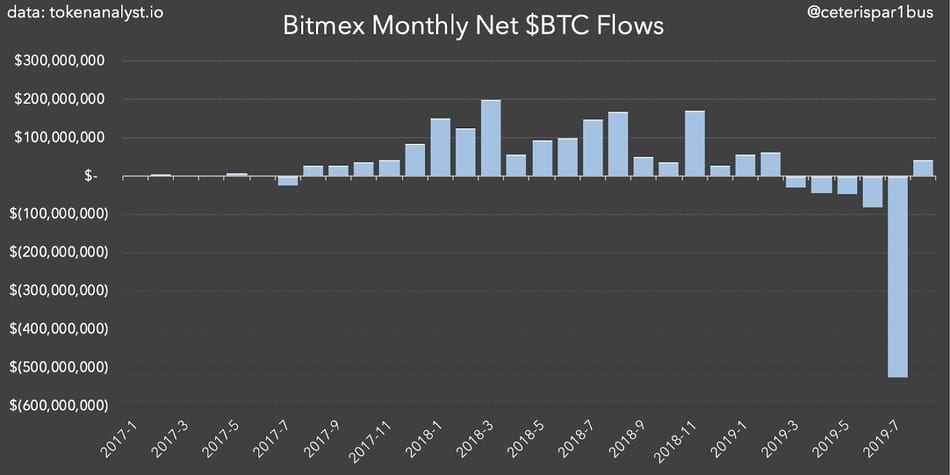
Source: ceterispar1bus
Following this, various thorny issues arose: on November 1, BitMEX accidentally leaked a large number of user email addresses, leading to the situation gradually spiraling out of control. Shortly after, hackers breached BitMEX's Twitter account and mockingly posted two tweets: "Take your BTC and run. Last day for withdrawals," and "Hacked." However, these were quickly deleted. Furthermore, someone even created a new Twitter account, continuously leaking user IDs and emails. Nevertheless, BitMEX could only assert in a dignified manner: Funds are safe.
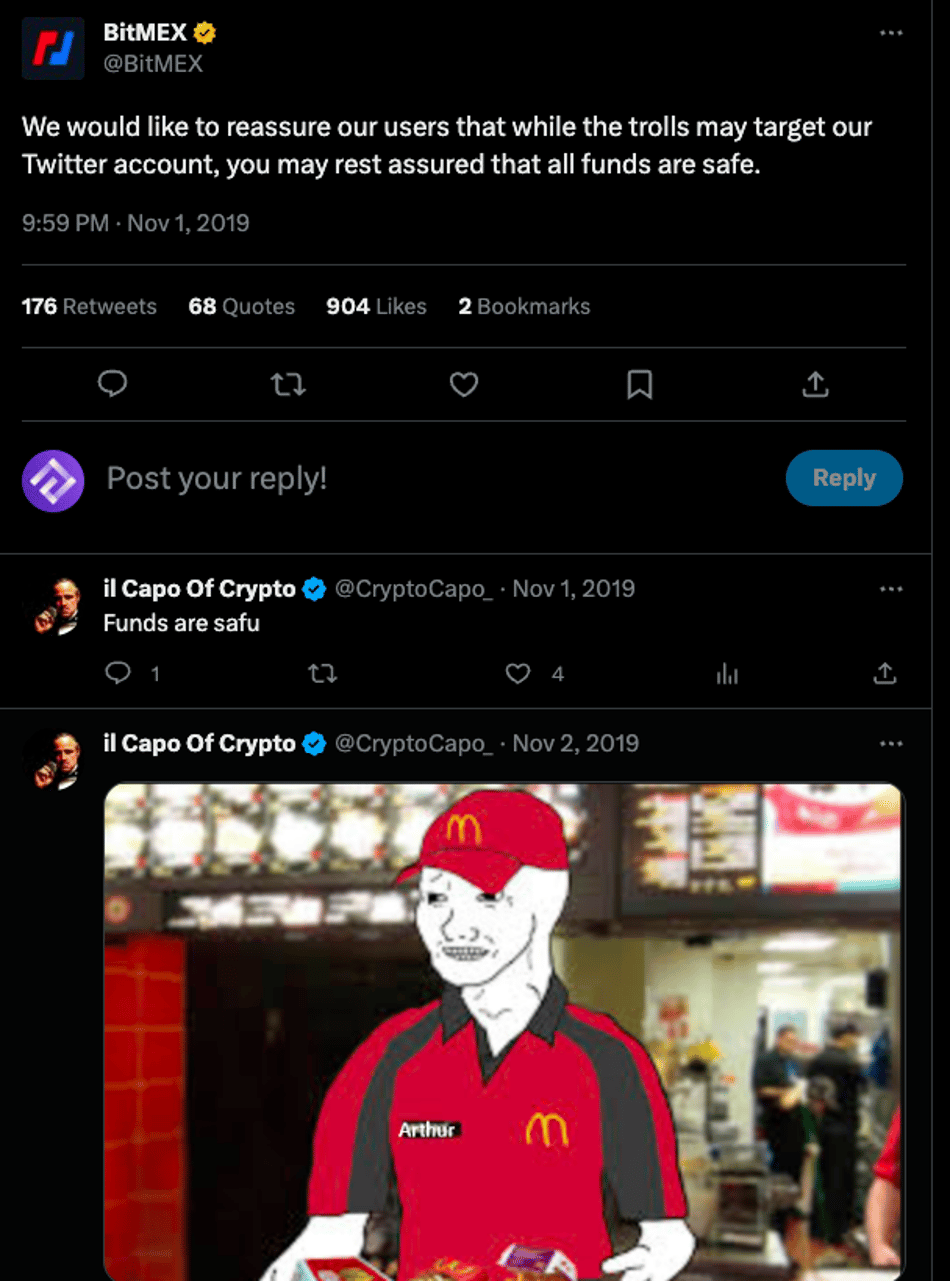
Source: BitMEX
Mounting Lawsuits
Entering 2020, BitMEX had not yet recovered from the 312 incident when it ran into more trouble. On May 16, BitMEX received a lawsuit from BMA LLC (Bitcoin Manipulation Abatement) in California, accusing BitMEX and its executives, including Hayes, of money laundering, fraud, and operating a cryptocurrency exchange without a license, among other criminal activities. The plaintiff emphasized that in 2019, 15% of BitMEX's trading volume, approximately $138 billion, came from U.S. users, claiming that this was the "highest record of illegal trading in the U.S." As the saying goes, when it rains, it pours. When BitMEX was entangled in this lawsuit, it also experienced a series of unfortunate events, including shutting down its Japan service and server downtime and outages.
However, the plaintiff had limited recourse against BitMEX, as BitMEX deliberately registered in Seychelles to evade U.S. regulation. BMA could only indirectly prove BitMEX's operations in the U.S. through customer email information, which was later mocked by BitMEX personnel: "I'm registered in Seychelles, come and get me!" They remained defiant.
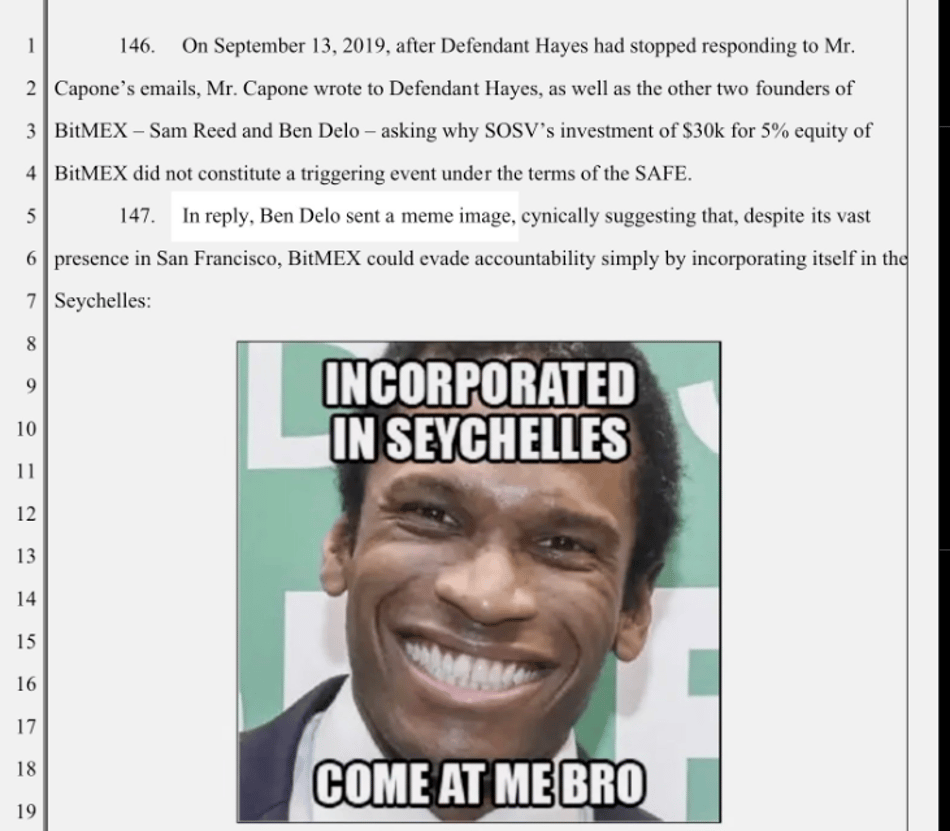
Source: US Gov
Unfortunately, the government then took serious action. Since the 2008 financial crisis, the emergence of Bitcoin has clearly raised concerns for governments around the world. Whenever Bitcoin's bull market arrives, central banks around the world fear that Bitcoin will disrupt their control, especially in the year of the 2020 pandemic. From MicroStrategy's aggressive accumulation of BTC to the Nigerian government's fear of being unable to control the $140 million worth of Bitcoin bets made by the people and subsequently banning trading, to Musk selling Tesla stock to acquire Bitcoin, this series of signals made the Federal Reserve feel the need to take action. At this opportune moment, when Hayes was at his most exuberant, they targeted BitMEX and Hayes, the perfect scapegoat: young, flamboyant, overnight wealth, ill-gotten gains, and a black man, making him the perfect target.
In October 2020, at the beginning of a new bull market, Hayes and two other BitMEX founders were jointly charged by the U.S. Department of Justice and CFTC, with the charges being similar to previous ones: BitMEX, not registered in the U.S., had a large number of U.S. customers and was suspected of illegal money laundering activities, thus violating the Bank Secrecy Act of 1970, also known as the Currency and Foreign Transactions Reporting Act. BitMEX thus became the first cryptocurrency exchange to be sued for violating the Bank Secrecy Act. The reason Hayes was targeted was because, earlier, when dealing with the CFTC, he did not hand over his client information to the CFTC, and the CFTC also had a certain retaliatory intent. According to reports, within 48 hours of the CFTC's lawsuit, over 45,000 BTC were withdrawn and flowed to other exchanges.
Upon this incident, Hayes reacted swiftly, resigning from the CEO position and jointly creating a new entity, 100x Group, with Reed and Delo to manage BitMEX more securely. The new CEO, Alexander Hoptner, also stated that they were prepared to face the lawsuit. Reportedly, on the day Hayes resigned, BitMEX directly lost approximately $400 million in user deposits, seemingly indicating that the tide had turned.
Surrender in Honolulu
On April 6, 2021, a private plane from Singapore slowly landed in Honolulu, Hawaii, and Hayes was arrested at the airport wearing a casual T-shirt. The FBI boarded the plane, verified his fingerprints and saliva, and then, wearing bulletproof vests, handcuffed Hayes and escorted him to court. This was Hayes's first visit to the U.S. since 2018, but it was a far cry from the time when he was driving a Lamborghini in New York.
Although he surrendered, Hayes did not plead guilty in court, which was the optimal decision after taking legal advice: he is still putting up a fight. As early as March, another co-founder, Ben Delo, surrendered to the Supreme Court in New York and also did not plead guilty. After Hayes's team posted a $10 million bail, he was detained in isolation for over a dozen days. Finally, after resolving a series of issues, Hayes boarded a flight back to Singapore. During the pandemic, Hayes remained in Singapore. Several months later, in August, BitMEX finally reached a settlement with the CFTC, agreeing to pay a $100 million fine, seemingly emerging unscathed.
Both co-founders have surrendered to the authorities, but Reed from Wisconsin has had a tougher time: Reed was actually arrested in October, living in the suburbs of South Boston with his wife and three-month-old child. According to media reports, in the early hours of the morning, over a dozen FBI agents and police officers stormed in, handcuffing him to a chair. Reed was then taken to a mysterious federal building and detained in a dark, damp basement for ten hours, even having his feet shackled.
Whether due to the terrifying prison life or for other reasons, Hayes eventually surrendered. In February 2022, Hayes and two other co-founders pleaded guilty to the court, admitting to "contempt" of the Bank Secrecy Act and failure to enforce anti-money laundering regulations, and agreeing to each pay an additional $10 million fine. A federal prosecutor in the Southern District of New York told the court that BitMEX was a "tool for money laundering and criminal activity," conducting over $200 million in suspicious criminal transactions and failing to report anything to the government as required. The prosecutor claimed that at one point, Hayes unfroze an account belonging to suspected hackers, allowing them to withdraw assets of suspected stolen Bitcoin. The prosecutor wrote that because the company did not require traders to provide account identification details, "the full extent of BitMEX's criminal activity will never be known."
Justice Department lawyer Damian Williams said, "Arthur Hayes and Benjamin Delo created a platform that openly defied legal provisions; and they willfully disregarded the most basic anti-money laundering regulations."
With various pieces of evidence presented, the prosecutor naturally requested a heavy punishment from the court. Hayes himself attempted to show some remorse: "While I am indeed proud of BitMEX's achievements, I do regret my involvement in these criminal activities." There were also testimonies from friends pleading for him, such as Mike Novogratz, the current head of Galaxy Investment Partnership, who said, "Let's not forget, Arthur is a young, successful black man. Our country and industry need such black individuals."
In May 2022, under pressure from various sources including racial public opinion, the judge chose to give a lenient punishment, allowing Hayes to avoid imprisonment but still facing a 6-month home confinement.
Letting Go of the Past
According to media reports, Hayes was confined in a luxurious white three-bedroom suite in South Beach, Miami (indeed his own property), with a huge balcony overlooking the entire Biscayne Bay. Hayes spent his time there looking at Miami's skyline, feeling the sea breeze, doing yoga and exercising every day, or going out to play basketball and swim (according to his own description, he was allowed to exercise outdoors for a few hours every day). He even had fans recognize him when he went out to buy coffee. Hayes loves writing and rented a WeWork office nearby to meet his office and writing needs, and occasionally meet members of the local crypto native community.
However, Hayes's aversion to the United States is evident from many details of his life. While on the surface, his confinement there seemed like a vacation, he was particularly tense. "In the United States, I am very concerned about my personal safety because people can carry guns." He even felt the need to vent his anger at small insects. He felt that the ground-floor swimming pool was completely unusable due to too many mosquitoes, and complained, "In Singapore, they would do pest control." In the report, he also complained about many shortcomings of the United States: the large time difference from other countries, the disgusting food in the United States, and a deep-seated cultural aversion to the United States. "I don't plan to return to the United States, and I probably never will."
By early 2023, Hayes had spent quite some time in Hokkaido. According to his account, we can sense that he has indeed relaxed a lot: "I don't have any vision now, so let's just protect the customers' money first and not lose their Bitcoin."
In Conclusion
Once upon a time, there was a young man, intelligent and well-educated, who worked as a trader in traditional finance for a few years and felt dissatisfied, so he started his own exchange. He became wealthy overnight, became a Twitter celebrity, attracted attention, and led the crypto movement to success. He then defied the U.S. government, becoming a rebellious entrepreneur, attracting onlookers from outside the circle. He was arrogant and eventually faced retribution when the U.S. government retaliated. He also tried to resist but ultimately surrendered. He also changed Crypto.
This story sounds familiar. SBF: This isn't me. User: This is you. Hayes: This is clearly me.
Of course, despite similar experiences, their differences are also evident: one was a little later, the other a little earlier. One was a little white, the other a little black. One came from a wealthy family, the other from a mechanic. One was a couch potato, the other a bodybuilder. Of course, there is also a very important point: one took customers' money and had clear evidence against him, while the other, although facing many accusations, was never charged with misappropriating customer deposits.
Well, listeners, that's all for today's story. What each of you has learned, you can realize for yourselves. See you next time.
免责声明:本文章仅代表作者个人观点,不代表本平台的立场和观点。本文章仅供信息分享,不构成对任何人的任何投资建议。用户与作者之间的任何争议,与本平台无关。如网页中刊载的文章或图片涉及侵权,请提供相关的权利证明和身份证明发送邮件到support@aicoin.com,本平台相关工作人员将会进行核查。




